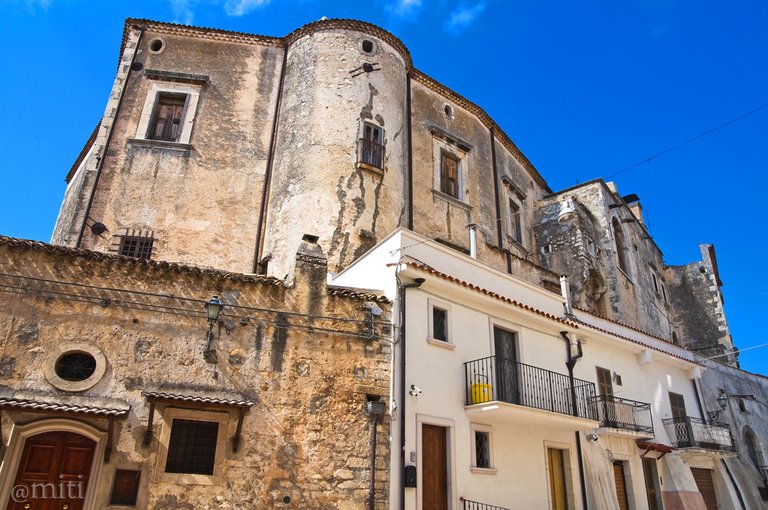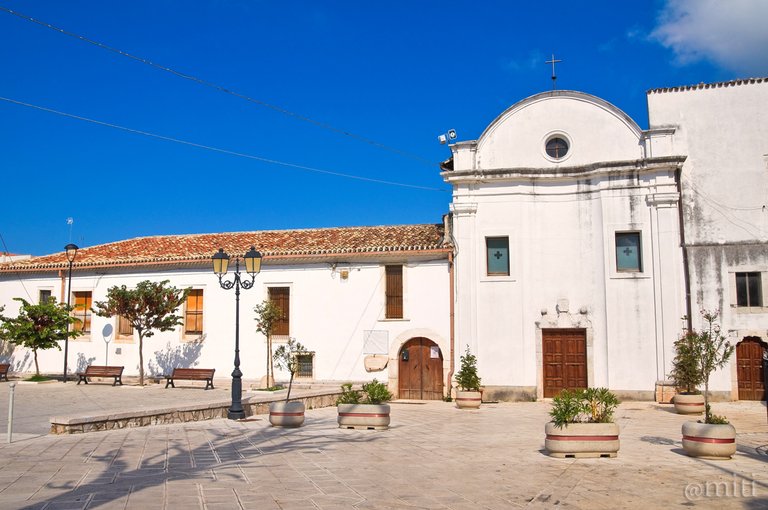
The Palace of the Pinto (Author's photo - All rights reserved)
Il Palazzo Pinto (Immagine dell'autore - tutti i diritti sono riservati)



Ciao a tutti,
questo è un viaggio attraverso l'Italia. Posterò una foto al giorno con una brevissima descrizione. Spero vi piaccia!

Ischitella è un piccolo borgo della provincia di Foggia, nella regione italiana meridionale della Puglia. Il villaggio è situato su una collina dominata da uliveti e macchia mediterranea a circa 300 metri sul livello del mare dove forma parte del Parco Nazionale del Gargano.
L'area intorno a Ischitella è stata abitata sin dai tempi preistorici e del Neolitico, come dimostrato dagli scavi che hanno portato alla luce molte reliquie, come la ceramica e altri oggetti in pietra che una volta erano utilizzati quotidianamente. Inoltre, sul monte Civita nei pressi di Ischitella sono venute alla luce due necropoli romane.
Nonostante l'antichità del sito in Puglia dove si trova il borgo, le origini dello stesso sono molto più recenti, come si apprende da un documento che afferma che la città risale al 1058.
Nel Medioevo il villaggio era sotto il dominio dei Normanni, degli Svevi (Federico II di Svevia (1194-1250) fu responsabile della costruzione del "castrum") e quindi degli Angiò. Durante questo periodo fu governata da diverse famiglie di nobili feudali, come i Gentile, i Durazzo e infine la famiglia Pinto.
Tra il XVI e il XVIII secolo la città fu dominata dagli spagnoli, poi dai francesi e infine dagli austriaci, fino all'unità d'Italia nel 1861.
L'antico villaggio è anche chiamato "Terra" ed è separato dalla parte più nuova, chiamata "Ponte". La Terra è caratterizzata da case con balconi che si affacciano sulle tortuose stradine che conducono ai principali monumenti della città.
Sulla cima di un'alta collina nel centro storico di Ischitella si trova il Palazzo del Pinto (ora chiamato Ventrella) che è un imponente edificio a tre piani con un imponente portale sulla facciata principale. Fu commissionato nel XVIII secolo da Francis Emmanuel Pinto (1697-1767), che lo costruì sulle rovine di un antico castello svevo.
Il castello o "castrum" fu costruito nel Medioevo dall'imperatore Federico II di Svevia. Esso crollò in seguito al terremoto del 1640, dopo di che l'antica fortezza divenne la residenza dei Principi Pinto.
Di notevole interesse artistico la chiesa romanica di Sant'Eustachio, patrono della città, con una facciata composta da modanature e fregi in pietra e il Convento di San Francesco sul cui ciottolato spicca il famoso albero di San Francesco d'Assisi caratterizzato, come vuole la leggenda, dalle radici al posto delle foglie.
Altri importanti monumenti religiosi di Ischitella sono la Chiesa di Santa Maria Maggiore (XVII secolo) a tre navate, adornata con statue lignee di vari santi e con opere della scuola napoletana e l'Abbazia di San Pietro.
Sulle rive del Lago di Varano, sorge la Chiesa del Crocifisso, costruita sulle rovine dell'antica cittadella medievale di Bayranum, circondata dalla natura incontaminata della Riserva Statale Isola di Varano, Ischitella e Carpino, mentre contornata dagli alberi di agrumi profumati, l'oasi si estende tra Rodi Garganico e Vico del Gargano.
Cose da vedere: Il Centro Storico, il Palazzo dei Pinto, la Chiesa di Sant'Eustachio, la Chiesa e il Convento di San Francesco, la Chiesa di Santa Maria Maggiore, la Chiesa del Crocifisso, l'isola di Varano, la necropoli sul Monte Civita, il Palazzo De Cata, l'Abbazia di San Pietro.

Hello everyone,
I began a Photo Journey through Italy. I will post one photo every day with a little note of explanation. I hope you like it!

Ischitella is a small town in the province of Foggia, in the southern Italian region of Puglia. The village is situated on a hill dominated by olive trees and Mediterranean bushes about 300 meters above sea level where it forms part of the Gargano National Park.
The area around Ischitella has been inhabited from the Prehistoric times and the Neolithic era, as shown by excavations that have unearthed many relics, such as ceramics and other stone implements that were once in daily use. Also, on Mount Civita near Ischitella came to light two Roman necropolis.
Despite the antiquity of the site in Puglia where the town is situated, the origins of the town itself are much more recent, as we learn from a document stating the city dates back to 1058.
In the Middle Ages the town was under the dominion of the Normans, the Swabians (Frederick II of Swabia (1194-1250) was responsible for the construction of the "castrum") and then the Anjou. During this period it was ruled by several families of feudal nobles, such as the Gentile, the Durazzo and finally the Pinto family.
Between the 16th and 18th centuries the town was dominated by the Spaniards, then the French and finally the Austrians, until the unification of Italy in 1861.
The ancient village is also called "Earth", and separate from the newer part, called the "Bridge". The 'Earth' is characterized by houses with balconies overlooking the winding narrow streets leading to the main monuments of the city.
On top of a high hill in the old town of Ischitella is the Palace of the Pinto (now called Ventrella) which is an imposing three-storey building with an impressive portal on the main façade. It was commissioned in the 18th century by Francis Emmanuel Pinto (1697-1767), who built it on the ruins of an ancient Swabian castle.
The castle or "castrum" was built in the Middle Ages by Emperor Frederick II of Swabia. The castle collapsed following the earthquake of 1640, after which the ancient fortress became the residence of the Pinto Princes.
Of remarkable artistic interest the Romanesque church of Sant’Eustachio, the patron saint of the town, with a façade composed of mouldings and friezes in stone and the Convent of San Francesco on whose cobblestones stands out the famous tree of Saint Francis of Assisi characterized, as it wants the legend, from the roots to the place of the leaves.
Other notable religious monuments in Ischitella are the Church of Santa Maria Maggiore (17th century) with three naves, adorned with wooden statues of various saints, and with works of the Neapolitan school and the Abbey of San Pietro.
On the shores of Varano Lake, there is the Church del Crocifisso, built on the ruins of the ancient medieval citadel of Bayranum, surrounded by the unspoilt nature of the Varano Island State Reserve and Ischitella Forests and Carpino, while the sweet-smelling citrus trees oasis stretches between Rodi Garganico and Vico del Gargano.
Thing to see: The Historic Centre, the Palace of the Pinto, the Church of Sant’Eustachio, the Church and Convent of San Francesco, the Church of Santa Maria Maggiore, the Church del Crocifisso, the Varano Island, the necropolis on Mount Civita, De Cata Palace, the Abbey of San Pietro.

| Tipo di foto / Category | Paesaggio / Landscape view |
| Esposizione / Settings | 1/320 sec, ISO 200, f/10 |
| Camera | Nikon D5000 |
| Lente / Lens | Tamron SP 17-50mm f/2.8 XR Di II LD |
| Filtro / Filter | Polarizzatore Hoya / Hoya Polarizing filter |
| Cavalletto / Tripod | Manfrotto MKC3-P01 |
| Località / Location | Ischitella (Foggia), Italia |
| Software | Photoshop |


The Church and Convent of San Francesco (Author's photo - All rights reserved)
La Chiesa e il Convento di San Francesco (Immagine dell'autore - tutti i diritti sono riservati)
wow your posts are all over the front page
I hope I deserve it.
“When words become unclear, I shall focus with photographs. When images become inadequate, I shall be content with silence.”
Congratulations, Your Post Has Been Added To The Steemit Worldmap!
Author link: http://steemitworldmap.com?author=miti
Post link: http://steemitworldmap.com?post=a-journey-through-italy-one-photo-every-day-95-ischitella-eng-ita
Want to have your post on the map too?
my favorite place is italy and i am looking forward to visit there soon
by the way nice photos bro
keep steeming
@miti
Thanks.
Wao, it's a very old city. Since prehistory !!!
Yes...it's an antique land.
Dope
:-)
Ciao @miti è da un po' che tengo d'occhio il tuo account e devo dirti che sei un grande. Ogni giorno fai riscoprire a noi italiani ed ad altre persone le bellezze della nostra terra. Se un giorno vieni nel trevigiano fatti sentire che ti dico un po' di borghi spettacolari e poco conosciuti:)
Ciao e grazie davvero!
Ho ancora tanto da visitare e questi ultimi due anni io e mia moglie abbiamo un pò rallentato per la nascita di mia figlia. Adesso ha quasi tre anni e comincia a manifestare la nostra passione per i viaggi, quindi tra poco si riparte e la tua zona, insieme a tutto il Veneto, era tra quelle che volevamo visitare. ;-)
Non vedo l'ora di vedere i primi post sul Veneto;)
Ti ho mandato una richiesta d'amicizia su discord(penso che funziona così) così quando hai bisogno posso consigliarti qualche posto da visitare.
@miti historical buildings always inspires the visitors beautifull view from the front amazing
Yes, it's really amazing.
@miti So beautiful these pictures and amazing article. Thanks
You're welcome.
awesome blog..
hello @miti awesome blog so beutifull
Going to Italy soon, Nola, to see a tradition that was brought to the US 131 years ago
I'm sure you'll enjoy!
wow what a task one photo every day u have almost done century
I'm sure I can up it to 200.
i also like journy.
Thanks.
Totally incredible
Heard alot about Italy, ahl pay a visit sometime.
Your shot got me, its lovely sir.
I see your enjoying your travel, and taking greay shots
Italy is so beautiful.. I could shoot it off indefinitely.
tipuvote! :)
ooops!
Seems that you have no deposit. Plase send any amount of SBD to @tipU to use @tipU services :)
The pictures catches the atmosphere perfectly...great work
Thanks
welcome :))
You got a 30.64% upvote from @ocdb courtesy of @miti!
Italy is beautiful
Stai facendo conoscere dei bellissimi posti... con le tue stupende foto! Da italiano ti dico grazie! Buon lavoro e buon proseguimento. Un saluto @giornalista
Excellent article. I really liked it. Good luck to you and Love.